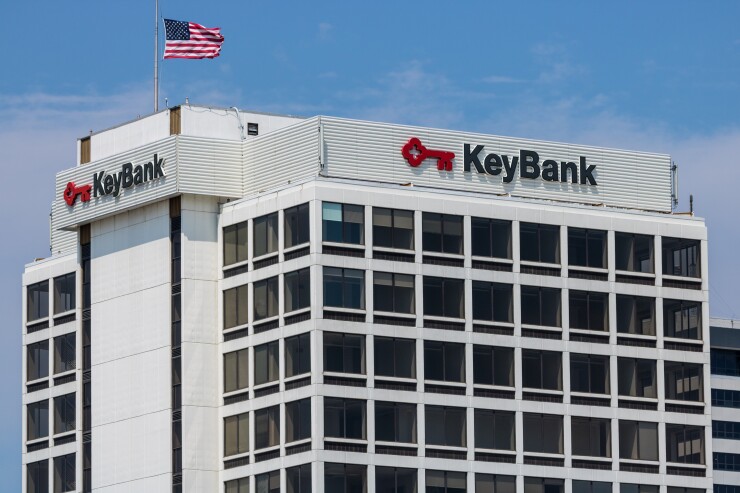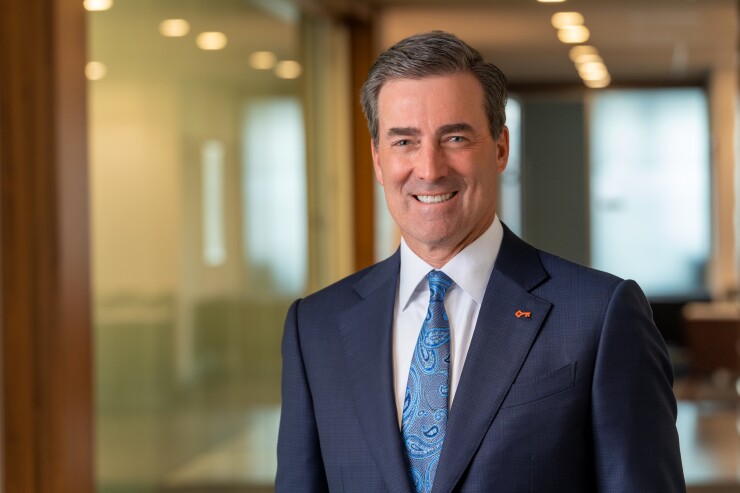
KeyCorp Chairman and CEO Chris Gorman delivered a mea culpa to analysts on a conference call Thursday, acknowledging that the $188.3 billion-asset bank "was not well positioned" for the rapid rise in interest rates that occurred in 2023.
"As a result, we missed our own expectations and yours," Gorman added.
The new year will be a different story, Key executives promised Thursday.

Cleveland-based Key looks set to benefit from billions of dollars in short-term swaps and Treasury securities repricing throughout 2024 and into 2025, generating increased interest income. Commenting during the company's fourth-quarter earnings conference call, Chief Financial Officer Clark Khayat estimated the benefit at $500 million for the year.
Key also expects to gain an advantage from solid credit quality, which Gorman described as "the most important determinant of return on tangible common equity and shareholder value over time." Key reported net charge-offs of $76 million for the quarter ending Dec. 31, or 0.26% of average loans. While the total represented a modest linked-quarter increase, it remained well below the low end of Key's 40-to-60-basis-point target range.
Nonperforming loans totaled $574 million, or 0.51% of total loans, at the end of 2023. Again, that represented a linked-quarter increase, but strong collateral and proactive servicing efforts should keep actual losses to a minimum, according to Gorman and Khayat.
"The nonperforming asset uptick really is a small list of identified credits, most of which we feel very good about the loss content," Gorman said. "So, it's a pickup in the ratio, but we don't think that's a loss driver." Indeed, Gorman,
"Credit quality remains one of our most significant strengths," Gorman said.
Deposits proved another strong suit for Key. The bank allowed $2 billion in brokered deposits to roll off its books. That decline was offset by gains in commercial and consumer deposits, with the net result being a $3 billion year-over-year increase in deposits to $145.6 billion.
Key began to see the benefits from its securities portfolio repricing in the fourth quarter of 2023, with net interest income for the three months ending Dec. 31 totaling $928 million, up $5 million sequentially. The company's third-quarter result of $923 million represented Key's
Overall, Key reported quarterly net income of $30 million, $0.03 per diluted common share. That result, however, was impacted by a number of one-time charges, the largest of which was a special Federal Deposit Insurance Corp. assessment that also dragged down other big banks' earnings during the fourth quarter. In Key's case, the special FDIC fee totaled $190 million.
Key's adjusted net income, absent one-time charges, totaled $0.26 per share, "a number that was better than we expected," Piper Sandler analyst Scott Siefers wrote Thursday in a research note.
Citing projected tailwinds from Key's securities portfolio, Siefers boosted his full-year 2024 earnings estimate by six cents to $1.31 per share. "The net-interest-income set up is still a good one for this year, and it's even better for 2025," Siefers wrote.
It appears to be a major turnaround from 2023, when a string of Federal Reserve rate hikes hit Key — with a balance sheet weighed down by low-yielding loans and investments — hard. Scores of other banks, to be sure, faced similar challenges, but the impact was especially pronounced at Key, which saw net income drop by 23% in the 12 months ending Sept. 30.
"Stand-alone credit, properly graded, can't return its cost of capital," Gorman said.
Key reduced its total risk-weighted assets, which are used to determine minimum capital requirements, by $14 billion in 2023, exceeding its $10 billion target. Total assets declined by $1.5 billion last year to $188.3 billion. While Key is forecasting a decline in average total loans in 2024, that trend is expected to be offset by increased noninterest income, as well as by the added revenue from swaps and securities.
As a result of the downsizing, Key ended 2023 on a strong note in terms of capital, reporting a Common Equity Tier One ratio of 10%, exceeding regulatory minimums. Given the
"We do not expect to be buying back our stock in the near term," Khayat said.






